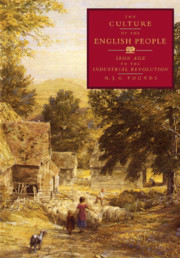Book contents
- Frontmatter
- Contents
- List of illustrations
- List of tables
- Preface
- List of abbreviations
- Map of traditional counties, with abbreviations, as used in this book
- Introduction
- 1 The view from Danebury
- 2 Roman interlude
- 3 House and household
- 4 Heat, light and insecurity
- 5 The house furnished
- 6 Food, its production, preservation and preparation
- 7 In sickness and in death
- 8 The community of parish and village
- 9 The family
- 10 The culture of cities
- 11 The foundations of popular culture
- 12 Conclusion: the end of popular culture
- Notes
- Index
6 - Food, its production, preservation and preparation
Published online by Cambridge University Press: 06 July 2010
- Frontmatter
- Contents
- List of illustrations
- List of tables
- Preface
- List of abbreviations
- Map of traditional counties, with abbreviations, as used in this book
- Introduction
- 1 The view from Danebury
- 2 Roman interlude
- 3 House and household
- 4 Heat, light and insecurity
- 5 The house furnished
- 6 Food, its production, preservation and preparation
- 7 In sickness and in death
- 8 The community of parish and village
- 9 The family
- 10 The culture of cities
- 11 The foundations of popular culture
- 12 Conclusion: the end of popular culture
- Notes
- Index
Summary
Such a run of wet seasons as we have had the last ten or eleven years would have produced a famine a century or two ago.
Gilbert White, Natural History of SelborneIn traditional Britain the choice of foodstuffs was severely limited. Most people ate only what their local area produced, and even then, they largely confined themselves to what it could produce most easily and abundantly. The volume of the crop was more important than its quality, for they lived for much of their lives on the edge of starvation. It was cereal crops which, under conditions prevailing in traditional societies, yielded most abundantly and most reliably, and it was on the breadgrains that most people depended for the greater part of their food supply.
The bread throughout the land [wrote William Harrison] is made of such grain as the soil yieldeth, the gentility commonly provide themselves sufficiently of wheat for their own tables, whilst their household and poor neighbors in some shires are enforced to content themselves with rye or barley; yea, and in time of dearth, many with bread made either of beans, peason, or oats, or all together and some acorns among …
The factors governing diet, that is the variety and the relative abundance of foodstuffs, were many. Among them the local soil and terrain were of foremost importance. Without anything beyond an empirical knowledge of agronomy and soil science, people had learned to adapt their cropping systems as far as was practicable to local conditions.
- Type
- Chapter
- Information
- The Culture of the English PeopleIron Age to the Industrial Revolution, pp. 174 - 219Publisher: Cambridge University PressPrint publication year: 1994
- 1
- Cited by



